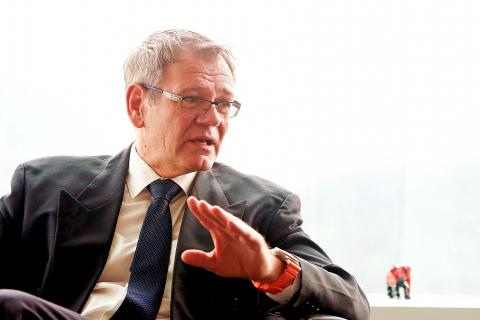Germany recognizes the role that Taiwan plays in international affairs and supports its participation in global forums, German Institute Taipei Director-General Thomas Prinz said.
Germany recognizes “the constructive role Taiwan plays in international affairs,” Prinz told reporters in an interview on Wednesday, adding that the country would therefore support Taiwan wherever it can within the framework of its “one China” policy.
“Of course we would like to see Taiwan contributing and cooperating in the international forum,” said Prinz, citing the World Health Assembly and Interpol. “But unfortunately that is not in our hands, we try to support Taiwan, but the given situation is quite complicated.”

Photo: CNA
Regarding current cross-strait relations, which have been strained since President Tsai Ing-wen (蔡英文) assumed office in May 2016, Prinz said that any step taken by each side to reduce tensions in the Taiwan Strait would be appreciated.
“Nobody can win in a violent conflict. I think China is aware of that. The stability in this part of the region is in the utmost interest of all the stakeholders,” he said.
The international community needs China as a constructive partner — especially on issues related to climate change and the WTO — and China needs partners as well, Prinz said.
“In the end we all profit from a rules-based international order,” he added.
Calling Taiwan a like-minded democracy, Prinz said that Germany would continue to support it “as much as we can under the difficult circumstances.”
Regarding his country’s experience with transitional justice, Prinz said that it is not about seeking retribution against historical perpetrators or destroying a specific political party, but about creating harmony in society and addressing the injustices of the past.
Germany launched a transitional justice policy after reunification in 1990, when the German Democratic Republic became part of the Federal Republic of Germany.
Thousands of German citizens were victims of the former communist system in East Germany “who were spied on by their neighbors, sometimes by their families,” Prinz said. “These people wanted to know what has happened.”
In response to such demands, the new German government opened the files kept by the East German State Security Service, commonly known as the Stasi, to the general public, for everyone to consult, Prinz said.
Openness and making such files available were important to restoring truth and justice, he added.
Another lesson that Germany learned in the process of seeking transitional justice is that “we do not take revenge,” Prinz said.
“If you start taking revenge, you open a new area of conflict,” he added.
For instance, if the government puts perpetrators in jail or takes away their assets, such moves can alienate people “to an extent where they will not play a constructive role in society,” he said.
“So that is what we learned from our experience, to find a more or less harmonious way to deal with it without opening new lines of conflict,” he said.
Regarding the Chiang Kai-shek Memorial Hall, which the Democratic Progressive Party government considers a “controversial space” that needs to be recharacterized, Prinz said that he considers the buildings part of history.
“You can’t extinguish history by demolishing a building,” he said. “Sometimes it is better to put the monuments or the buildings in a certain frame to explain why they are there, to explain what happened in this time, instead of demolishing them.”
Giving monuments or buildings a “new democratic context,” “opening them for civil society to use and other purposes” would be a good choice, he added.

A strong continental cold air mass is to bring pollutants to Taiwan from tomorrow, the Ministry of Environment said today, as it issued an “orange” air quality alert for most of the country. All of Taiwan except for Hualien and Taitung counties is to be under an “orange” air quality alert tomorrow, indicating air quality that is unhealthy for sensitive groups. In China, areas from Shandong to Shanghai have been enveloped in haze since Saturday, the ministry said in a news release. Yesterday, hourly concentrations of PM2.5 in these areas ranged from 65 to 160 micrograms per cubic meter (mg/m³), and pollutants were

Taiwan’s armed forces have established response protocols for a wide range of sudden contingencies, including the “Wan Chun Plan” to protect the head of state, the Ministry of Defense (MND) said today. After US President Donald Trump on Saturday launched a series of airstrikes in Venezuela and kidnapped Venezuelan President Nicolas Maduro, concerns have been raised as to whether China would launch a similar “decapitation strike” on Taiwan. The armed forces regularly coordinate with relevant agencies and practice drills to ensure preparedness for a wide range of scenarios, Vice Minister of National Defense Hsu Szu-chien (徐斯儉) told reporters before a

EVA Airways on Saturday said that it had suspended a pilot and opened an investigation after he allegedly lost his temper and punched the first officer several times as their plane was taxiing before takeoff at Los Angeles International Airport. According to a report published on Thursday by The Reporter, the incident occurred after the flight’s Malaysian first officer tried to warn the Taiwanese pilot, surnamed Wen (文), that he was taxiing faster than the speed limit of 30 knots (55.6kph). After alerting the pilot several times without response, the first officer manually applied the brakes in accordance with standard operating

Japanese Councilor Hei Seki (石平) on Wednesday said that he plans to visit Taiwan, saying that would “prove that Taiwan is an independent country and does not belong to China.” Seki, a member of the Japan Innovation Party, was born in Chengdu in China’s Sichuan Province and became a naturalized Japanese in 2007. He was elected to the House of Concilors last year. His views on the Chinese Communist Party (CCP) — espoused in a series of books on politics and history — prompted Beijing to sanction him, including barring Seki from traveling to China. Seki wrote on X that he intends